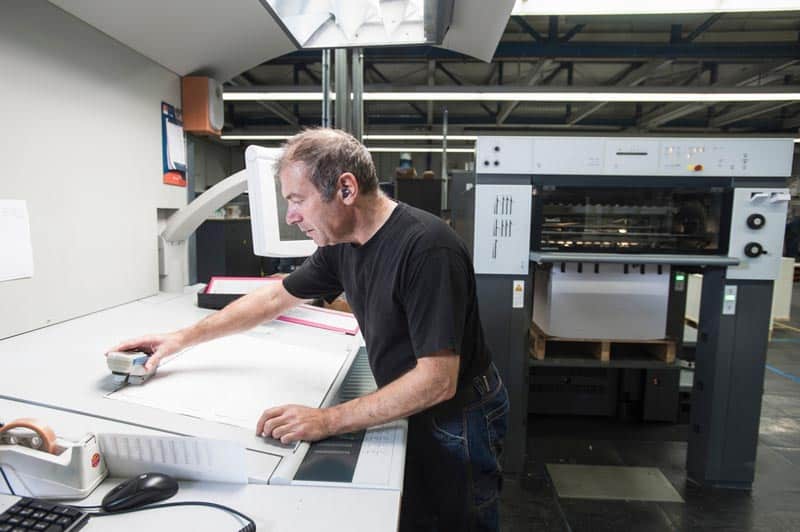In the vast landscape of industries, the role of machine operators often goes unnoticed, yet it is one of the most crucial positions in the manufacturing and production process. Machine operators are the backbone of any production line. They are the ones who ensure that the wheels of industry keep turning, quite literally.
Machine operators work in a variety of settings, from small workshops to large industrial complexes. They operate and maintain the machinery that produces everything from car parts to furniture, from food products to electronics. Their work is vital to our daily lives, even if we don’t always see it. Every product we use, every item we consume, has likely passed through the hands of a machine operator at some point.The role of a machine operator is not just about operating machinery. It’s about precision, efficiency, and safety. Machine operators need to have a keen eye for detail, as even the smallest error can lead to significant production issues. They need to understand the intricacies of the machines they operate, often handling complex equipment that requires specialized training and skills.
Moreover, machine operators play a significant role in ensuring workplace safety. They are trained to handle machinery safely, reducing the risk of accidents and injuries. They are often the first line of defense when it comes to identifying potential safety hazards, making their role even more critical.
In essence, machine operators are the unsung heroes of the manufacturing world. They are the ones who keep the production lines running smoothly, ensuring that businesses can deliver their products on time and to the highest quality standards. They are the ones who make sure that when you switch on your television, open a can of soda, or drive your car, everything works as it should.
The Intricacies of Being a Machine Operator
A machine operator’s role is multifaceted and requires a unique blend of skills and qualifications. Their duties extend beyond merely operating machinery. They are responsible for setting up the machine before each production run, ensuring it’s calibrated correctly and ready to produce the desired output.
Machine operators work with a variety of machines, each with its own set of specifications and requirements. These can range from CNC machines, which are used for cutting, drilling, and shaping materials, to lathes, which are used for shaping metal, wood, or other materials. They may also operate grinders, which are used to smooth and finish surfaces, or milling machines, which are used to cut and shape solid materials.
Each type of machine requires a specific set of skills and knowledge. For instance, operating a CNC machine requires knowledge of computer programming and CAD software, while operating a lathe requires a good understanding of the properties of different materials and the ability to work with precision.
Machine operators also need to be adept at troubleshooting. Machines can and do break down, and when they do, it’s often the operator who is the first to respond. They need to be able to identify the problem, whether it’s a mechanical issue or a software glitch, and either fix it themselves or know when to call in a specialist.
In addition to these technical skills, machine operators also need a range of soft skills. They need to be detail-oriented, as even a small mistake can have significant consequences in a production environment. They need to be able to work under pressure, as production schedules can be tight and any delay can have a knock-on effect down the line. And they need to be able to work as part of a team, as they often work closely with other operators, technicians, and engineers.
Becoming a machine operator often requires a high school diploma or equivalent, although some positions may require a vocational certificate or associate’s degree. Many machine operators also undergo on-the-job training, where they learn the specifics of the machines they will be operating and the safety procedures they need to follow.

Navigating the Hiring Maze for Machine Operators with RSS Inc.
The hiring process for machine operators is a critical juncture in the production cycle. It’s where employers find the individuals who will keep their machines running smoothly and efficiently. This process involves several steps, each designed to ensure that the right person is placed in the right role. However, the process can be made significantly easier with the help of a staffing agency like RSS Inc.
RSS Inc. is a family-run company with extensive experience in labor shortage projects. They have nurtured a vast database of battle-tested workers ready to mobilize at a moment’s notice. Their personnel is carefully screened and prepared to perform immediately and professionally.
The first step in hiring a machine operator is creating a detailed job description. This should outline the specific duties and responsibilities of the role, the types of machines the operator will be expected to handle, and the skills and qualifications required. RSS Inc. can help employers with this process, ensuring that the job description is clear, specific, and attractive to the right candidates.
Once the job is posted and applications start coming in, RSS Inc. can handle the initial review of each candidate’s qualifications. They look for individuals who have the necessary technical skills, but also those who demonstrate the soft skills that are crucial for the role, such as attention to detail, problem-solving abilities, and teamwork.
Interviewing potential machine operators is the next step in the hiring process. With RSS Inc., employers can be assured that the candidates presented for interviews have been pre-screened and are a good fit for the role. RSS Inc. can also assist with the interview process, providing insights and advice based on their extensive experience in the industry.
Background checks and safety training are also integral parts of the hiring process. RSS Inc. handles these aspects as well, ensuring that their machine operators can be trusted to handle expensive equipment and to work safely in a potentially hazardous environment. Safety training, in particular, is crucial, as it helps to reduce the risk of accidents and injuries.
In the end, the goal of the hiring process is to find a machine operator who is not only technically competent but also a good fit for the company’s culture and values. With RSS Inc., employers can streamline this process, saving time and resources while ensuring they get the best possible candidates for their machine operator positions. In the next section, we’ll flip the script and look at the process from the perspective of someone looking to get hired as a machine operator. But for now, let’s appreciate the careful thought and planning that goes into hiring the individuals who keep our factories and workshops running.
Getting Hired As a Machine Operator with RSS Inc.
For individuals seeking a career as a machine operator, the journey to landing the job involves several steps. It’s not just about having the right qualifications on paper, but also about demonstrating the right skills and attitude during the hiring process. This process can be made significantly easier with the help of a staffing agency like RSS Inc.
RSS Inc. is a family-run company with a proven track record of success in placing hard-to-find candidates in a wide variety of industries. They have a large pool of entry-level to highly skilled machine operators who are ready to be deployed to your workplace. This includes operators for CNC machines, metal furnace operators, lathe operators, extrusion operators, and many more.
The first step towards getting hired as a machine operator is to ensure that you have the necessary qualifications. This often includes a high school diploma or equivalent, and in some cases, a vocational certificate or associate’s degree. However, qualifications alone are not enough. Employers also look for practical experience and skills, which can often be gained through on-the-job training or apprenticeships. RSS Inc. can help candidates gain this experience through their extensive network of employers.
Creating an effective resume and cover letter is the next step. Your resume should clearly highlight your skills and experience related to machine operation. It should also showcase any relevant certifications you hold, such as CNC machine operation or safety training. Your cover letter, on the other hand, is your chance to show your enthusiasm for the role and explain why you would be a good fit for the company. RSS Inc. can provide guidance and support in crafting effective resumes and cover letters.
Preparing for the job interview is another crucial step. It’s important to research the company and the role beforehand so that you can answer questions confidently and show your interest in the job. Common interview questions for machine operators might include scenarios where you have to troubleshoot a problem or demonstrate your understanding of safety procedures. It’s also a good idea to prepare some questions of your own to show your interest in the role and the company. RSS Inc. can provide valuable insights and advice to help candidates prepare for these interviews.
In some cases, the hiring process might also involve practical tests. These could involve operating a machine under supervision or completing a task that demonstrates your skills. It’s important to approach these tests with confidence and to show your ability to work safely and efficiently. With RSS Inc., candidates can be assured of support and guidance throughout this process.
Getting hired as a machine operator is not just about having the right skills and qualifications, but also about showing your dedication, reliability, and attention to detail. With the right preparation and the support of a staffing agency like RSS Inc., you can stand out from the crowd and secure your place in this rewarding and vital profession. In the next section, we’ll explore the career path and growth opportunities for machine operators, providing insights into how you can progress and develop in this role. But for now, let’s appreciate the steps and effort that go into landing a job as a machine operator.
The Journey of Growth for Machine Operators
The career path for a machine operator is filled with opportunities for growth and advancement. Starting from entry-level positions, a machine operator can climb the ladder to supervisory roles or even transition into related fields, such as quality control or maintenance.
Entry-level machine operators typically start by operating one type of machine or working on a specific part of the production process. They learn the ropes under the guidance of more experienced operators or supervisors, gradually gaining the skills and knowledge they need to operate the machine independently.
As they gain experience, machine operators can take on more complex tasks or operate more advanced machines. They may also have the opportunity to cross-train on different machines, broadening their skill set and making them more valuable to their employer.
Continuing education and training are key to advancement in this field. Many employers offer on-the-job training programs, and there are also vocational schools and community colleges that offer courses in machine operation and related fields. Certifications, such as those offered by the National Institute for Metalworking Skills, can also enhance a machine operator’s career prospects.
Professional organizations and unions can also play a role in a machine operator’s career development. These organizations often offer resources such as training programs, networking opportunities, and industry news and updates. They can also provide support and advocacy on issues such as wages, working conditions, and safety standards.

Machine Operators in the Age of Automation
The future of machine operation is being shaped by technological advancements, particularly automation and artificial intelligence (AI). These technologies are transforming the manufacturing industry, changing the way machines are operated, and influencing the skills required by machine operators.
Automation has been a part of the manufacturing industry for decades, but its impact is becoming more pronounced with the advent of more sophisticated technologies. Machines are becoming more autonomous, capable of performing complex tasks with minimal human intervention. This has led to increased efficiency and productivity, but it has also raised questions about the future role of machine operators.
However, rather than replacing machine operators, automation is changing the nature of their work. Instead of manually operating machines, operators are increasingly tasked with overseeing automated systems, troubleshooting problems, and making adjustments to ensure optimal performance. This requires a new set of skills, including a deeper understanding of the machines they oversee and the ability to work with advanced software systems.
Artificial intelligence is another technology that is influencing the role of machine operators. AI can be used to predict machine failures, optimize production processes, and even assist in the design of new products. For machine operators, this means that they need to be comfortable working with AI systems and interpreting the data they produce.
The demand for machine operators is expected to remain strong, despite the rise of automation and AI. The skills and expertise of human operators are still crucial, particularly in situations that require problem-solving, decision-making, and a human touch. Furthermore, as machines become more complex, the need for skilled operators to oversee them only increases.
Machine operators who are willing to adapt and evolve with these changes have a bright future ahead. By embracing new technologies and continuously updating their skills, they can ensure their relevance in the industry and take advantage of new opportunities that arise.
Machine Operators – Hiring & Getting Hired
As we conclude our exploration into the world of machine operators, it’s clear that this profession is a vital cog in the machinery of our industries. Machine operators are the unsung heroes who keep our production lines running, ensuring the smooth creation of products we use every day.
We’ve delved into the intricacies of the machine operator’s role, understanding that it’s not just about operating machinery, but also about precision, efficiency, and safety. We’ve seen how the hiring process, whether conducted by an employer or streamlined through a staffing agency like RSS Inc., is a careful balance of assessing technical skills, practical experience, and the right attitude.
For those looking to step into the shoes of a machine operator, we’ve explored the journey from crafting an effective resume to acing the interview and practical tests. We’ve also highlighted the importance of continuous learning and growth, with opportunities for advancement and the chance to broaden one’s skill set.
Looking ahead, we’ve seen how the future of machine operation is being shaped by technological advancements like automation and AI. These technologies are not replacing machine operators but are transforming their roles, requiring them to adapt and evolve their skills.
In essence, the world of machine operators is dynamic and filled with opportunities. Whether you’re an employer looking to hire or an individual considering a career as a machine operator, understanding this world is the first step towards making the most of these opportunities.
As we wrap up, let’s appreciate the complexity and importance of the role of a machine operator. It’s a profession that demands skill, dedication, and a willingness to keep learning and growing. And for those who rise to the challenge, it offers a rewarding and fulfilling career.
Sources









